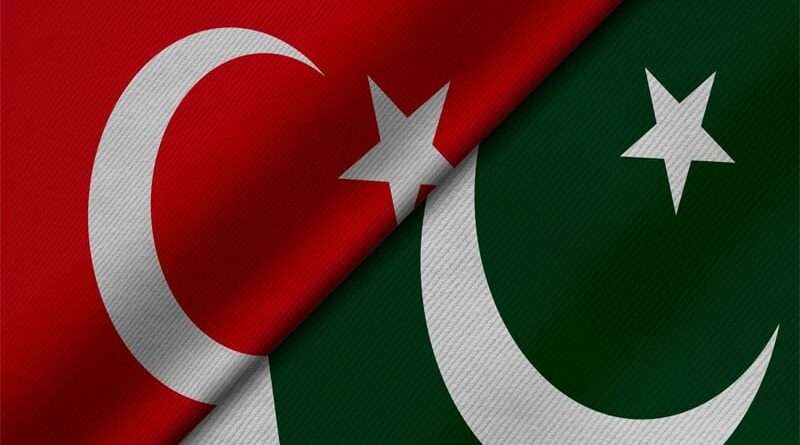Pakistan and Turkiye Eye $5 Billion Trade Partnership
|
Getting your Trinity Audio player ready...
|
Introduction
Pakistan and Turkiye are working towards strengthening their economic, trade, and industrial ties to achieve a $5 billion trade partnership. This collaboration aims to boost bilateral trade, address brain drain, and enhance investment opportunities. The Pakistan-Turkiye High-Level Strategic Cooperation Council (HLSCC) has proposed significant initiatives to drive growth in key sectors, including textiles, technology, energy, and defence.
Strengthening Bilateral Trade and Investment
Current Trade Relations Between Pakistan and Turkiye
The trade relations between Pakistan and Turkiye have been expanding over the years. In fiscal year 2024:
- Pakistan exported goods worth $335.3 million to Turkiye, including textiles, garments, agricultural products, and chemicals.
- Pakistan imported products worth $491.3 million from Turkiye, including machinery, electrical appliances, cotton, minerals, and medical equipment.
Implementing Free Trade Agreement (FTA) and Preferential Trade Agreement (PTA)
The Free Trade Agreement (FTA) between Pakistan and Turkiye has drastically reduced tariffs on 261 items, boosting Pakistan’s exports in key sectors such as textiles, leather, and agriculture. The Preferential Trade Agreement (PTA) also aims to create a more favorable trade environment by reducing trade barriers.
Economic Sectors for Growth and Development
Textile and Garment Industry
Pakistan’s textile sector is one of the largest contributors to its economy. By collaborating with Turkiye, Pakistan can:
- Enhance textile value addition.
- Establish direct trade routes for textile exports.
- Expand its presence in European and Middle Eastern markets.
Technology and Digitalisation
Turkiye has become a lucrative market for IT professionals. Pakistan can leverage this opportunity by:
- Strengthening joint ventures in artificial intelligence (AI) and digitalisation.
- Encouraging Pakistani IT professionals to participate in Turkiye’s technology-driven projects.
- Establishing joint training programs for ICT and quantum technologies.
Agriculture and Agro-Based Industries
Agriculture is another key sector for economic growth. Pakistan and Turkiye can collaborate in:
- Developing hybrid agriculture techniques.
- Improving agro-processing and export facilities.
- Enhancing the trade of rice, fruits, and oilseeds between the two nations.
Defence and Aerospace Collaboration
Defence cooperation between Pakistan and Turkiye has been steadily growing. Key areas include:
- Joint production of KAAN 5th-generation fighter jets.
- Manufacturing Bayraktar TB3 armed drones.
- Developing T-129 ATAK helicopters and naval ships.
Challenges and Solutions for Bilateral Trade Expansion
Addressing Non-Tariff Barriers
Turkiye’s non-tariff barriers and the liberal use of anti-dumping laws have been obstacles to Pakistan’s exports. A revised FTA should:
- Address and minimize these barriers.
- Ensure fair competition for Pakistani exporters.
- Promote equal market access.
Revival of Freight Cargo and Trade Routes
Enhancing trade logistics through freight cargo and Transports Internationaux Routiers (TIR) agreements can improve trade efficiency. Key steps include:
- Reviving direct freight cargo routes.
- Encouraging private sector involvement in logistics.
- Streamlining customs and trade regulations.
Combating Brain Drain and Enhancing Human Capital
Brain drain is a growing concern for Pakistan, particularly in the IT and engineering sectors. To tackle this:
- Pakistan and Turkiye can establish joint employment programs.
- Introduce incentives for skilled professionals to return and contribute to Pakistan’s economy.
- Develop technology parks to retain IT talent.
Future Prospects and Policy Recommendations
Expanding Joint Ventures and Industrialisation
To strengthen economic ties, both countries should:
- Facilitate private sector investments.
- Establish special economic zones (SEZs) for joint ventures.
- Encourage research and development collaborations.
Boosting Cultural and Tourism Exchanges
Enhancing people-to-people connectivity through tourism can foster better economic and diplomatic relations. Measures include:
- Launching tourism-friendly policies.
- Promoting cultural exchange programs.
- Encouraging investment in hospitality sectors.
FAQs
1. What are the major exports from Pakistan to Turkiye?
Pakistan exports textiles, garments, cotton, rice, fruits, chemicals, and leather products to Turkiye.
2. How can the Free Trade Agreement (FTA) benefit Pakistan?
The FTA reduces tariffs on 261 items, increasing Pakistan’s export competitiveness in Turkiye and European markets.
3. What steps can be taken to reduce trade barriers?
Negotiating the removal of non-tariff barriers, simplifying customs procedures, and revising the FTA can improve trade relations.
4. How can Pakistan and Turkiye collaborate in the defence sector?
Joint projects on fighter jets, armed drones, and naval ships can strengthen defence cooperation and technology exchange.
5. What initiatives can prevent brain drain from Pakistan?
Developing IT hubs, providing incentives for professionals, and establishing joint employment programs can help retain talent.
Conclusion
The Pakistan-Turkiye trade partnership holds immense potential for economic growth and industrial expansion. By implementing strategic trade policies, addressing key challenges, and fostering innovation, both nations can achieve their ambitious target of $5 billion in bilateral trade.




